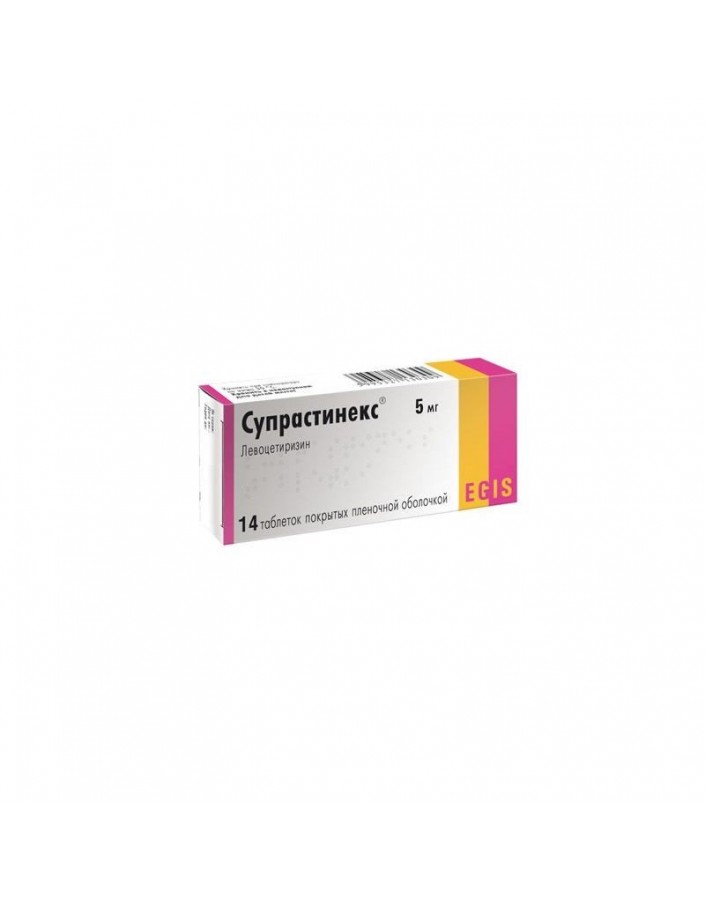




Security policy (edit with Customer reassurance module)

Delivery policy (edit with Customer reassurance module)

Return policy (edit with Customer reassurance module)
Tablets, film coated white or almost white, round, biconvex; with "E" engraved on one side and "281" on the other, with little or no odor. 1 tab.
levocetirizine dihydrochloride 5 mg, which corresponds to the content of levocetirizine 4.21 mgSilicon microcrystalline cellulose Prosolv HD90 (microcrystalline cellulose, anhydrous colloidal silicon dioxide), lactose monohydrate (37.9 mg), low substituted hyprolosis (L-HPC11), Magnesium stearate.
Histamine H1 receptor blocker. Levocetirizine - Cetirizine enantiomer, competitive histamine antagonist. Blocks H1-histamine receptors, the affinity for which is 2 times higher than that of cetirizine. It affects the histamine-dependent stage of allergic reactions, reduces the migration of eosinophils, reduces vascular permeability, limits the release of inflammatory mediators. Prevents the development and facilitates the course of allergic reactions, has antiexudative, antipruritic effect.
Virtually no anticholinergic and antiserotonergic actions. In therapeutic doses, almost no sedative effect.
Symptomatic treatment:
- year-round and seasonal allergic rhinitis and conjunctivitis (itching, sneezing, rhinorrhea, tearing, conjunctival hyperemia);
- hay fever (pollinosis);
- urticaria, incl. chronic idiopathic urticaria;
- Quincke edema;
- allergic dermatosis, accompanied by itching and rash.
The drug should be taken with food or on an empty stomach, with a small amount of water, do not chew the tablets.
The daily dose is recommended to take for 1 reception.
The recommended dose for adults and children over 6 years old, elderly patients (assuming normal kidney function) is 5 mg (1 tablet)
The duration of treatment depends on the disease. The course of treatment of pollinosis is on average 1-6 weeks. In chronic diseases (year-round rhinitis, chronic idiopathic urticaria), the course of treatment may be increased. There is a clinical experience of using the drug for up to 18 months.
In patients with chronic renal failure with CC from 30 to 49 ml / min, the dose should be reduced by 2 times (5 mg every other day); with QC from 10 to 29 ml / min, the dose should be reduced by 3 times (5 mg every 3 days). In case of severe renal failure (CC less than 10 ml / min), the drug is contraindicated.
When prescribing the drug to patients with isolated liver dysfunction, no dose changes are required.
Dose adjustment is recommended for patients with combined hepatic and renal dysfunction.
The side effect frequency parameters used below are defined as follows: very often (> 1/10); often (> 1/100, <1/10); infrequently (> 1/1000, <1/100); rarely (> 1 / 10,000, <1/1000); very rarely (<1/10 000).
On the part of the metabolism: very rarely - an increase in body weight.
From the side of the central nervous system: often - drowsiness, headache, fatigue; infrequently - asthenia; rarely - migraine, dizziness.
On the part of the respiratory system: very rarely - dyspnea.
On the part of the digestive system: often - dry mouth; infrequently - abdominal pain; very rarely - nausea, dyspepsia, changes in liver function tests.
Allergic reactions: very rarely - anaphylaxis, angioedema, pruritus, rash, urticaria.
- renal failure severe (CC less than 10 ml / min);
- сhildren's age up to 6 years (for this dosage form);
- pregnancy;
- lactation period;
- lactose intolerance, hereditary lactase deficiency lapp (lactase deficiency in some ethnic groups of the North) or glucose-galactose malabsorption syndrome (due to the content of lactose tablets);
- Hypersensitivity to the active (including to piperazine derivatives) or any auxiliary component of the drug.
With caution should be prescribed for chronic renal failure, elderly patients (possibly reducing glomerular filtration).
Studies conducted on animals have not revealed a direct or indirect adverse effect on pregnancy, embryo or fetus development, childbirth, or postnatal development. Controlled clinical studies on the safety of the drug in pregnant women have not been conducted, so the drug should not be prescribed during pregnancy.
Levocetirizine is excreted in breast milk, so if you need to use during lactation, breastfeeding at the time of taking the drug should be stopped.
Application for violations of the liver
When prescribing the drug to patients with isolated liver dysfunction, no dose changes are required.
Dose adjustment is recommended for patients with combined hepatic and renal dysfunction.
Application for violations of kidney function
In patients with chronic renal failure with CC from 30 to 49 ml / min, the dose should be reduced by 2 times (5 mg every other day); with QC from 10 to 29 ml / min, the dose should be reduced by 3 times (5 mg every 3 days). In case of severe renal failure (CC less than 10 ml / min), the drug is contraindicated.
Dose adjustment is recommended for patients with combined hepatic and renal dysfunction.
During the period of treatment it is recommended to refrain from the use of ethanol.
Influence on ability to drive motor transport and control mechanism
During the period of treatment, it is recommended to refrain from engaging in potentially hazardous activities that require increased concentration and psychomotor reactions.
Overdose symptoms in adults show drowsiness, in children - excitement, anxiety, which are replaced by drowsiness.
Treatment: there is no specific antidote. Recommended symptomatic and supportive therapy, gastric lavage. Hemodialysis is ineffective.
Studies of the interaction of levocetirizine showed no clinically significant interaction with pseudoephedrine, cimetidine, Ketoconazole, Erythromycin, Azithromycin, glipizide, and diazepam. Combined use with macrolides or ketoconazole did not cause significant changes in the ECG.
Theophylline (400 mg /) reduces the total clearance of levocetirizine by 16%. In this case, the pharmacokinetics of theophylline does not change.
Levocetirizine does not enhance the effects of ethanol; however, in sensitive patients, the simultaneous use of levocetirizine with ethanol or other means that depress the central nervous system may affect the central nervous system.
The drug should be stored out of the reach of children at a temperature not higher than 30 ° C.